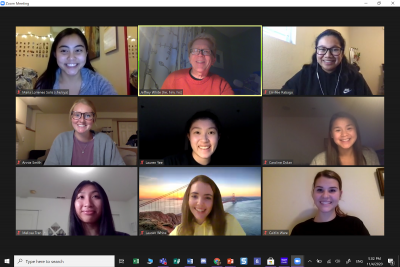The power of peer educators to help your students practice
We worked hard to become experts in our fields. We faculty work hard to plan and teach our classes. And now a pandemic has us working hard to continue and refine the shift to remote teaching. As professionals in teaching within higher education during trying times, we can leverage the Learning Commons’ peer educators to facilitate students’ practicing what we teach. Here’s both why we should make the benefits of trained peers helping peers visible to students and how we can best connect them with the Learning Commons’ highly trained peer staff.
The value of practice
Durable learning requires practice. In Make It Stick: The Science of Successful Learning, Peter Brown, Henry Roediger, and Mark McDaniel explain how the practice of mentally retrieving information supports durable learning. Deliberate practice involves effort, failure, and renewed attempts; it is necessary for acquiring, understanding, and applying new knowledge. Varying and spacing out practice also support learning, recall, and the ability to discriminate between different problems and techniques for solving them.
The Learning Commons offers opportunities for practicing a variety of tasks and content associated with classes that most faculty teach. Our trained peer educators tutor math, natural sciences, languages, and a variety of business, economics, and nursing courses. Our peer-assisted learning (PAL) facilitators offer weekly collaborative learning sessions for specific courses in math, nursing, and physics. For faculty who teach courses that require written papers and oral presentations, our Writing Center and the Speech and Presentation Lab provide opportunities to practice writing and presenting. We also support students who want to develop more effective study strategies. Many faculty use group projects to support learning. The Group Work Lab offers students the opportunity to practice how to work well in a group to enhance learning and performance.
As students connect with our trained peer educators, they enter a relationship that involves practice with content, problem solving, and the written and oral communication of new knowledge. Our peer staff have been trained in deploying processes that involve initial assessment of student needs and abilities, the demonstration of strategies, and ample time to practice that is capped off with summative assessment and planning for success in both learning and presenting new material and big ideas. Students also experience and identify with a more knowledgeable peer who can listen and respond to their needs.

When you leverage the Learning Commons to support student learning in your courses, you are also supporting yourself as a teaching faculty. Students who practice the material you teach will be better prepared to process actively the learning that you are working hard to facilitate. They will be more likely to retrieve concepts and problem solving approaches and with greater accuracy. Initial data from our PAL facilitation program reveals that students who participate in weekly PAL collaborative learning sessions are more likely to receive A and B grades and less likely to receive C and D grades or withdraw.
Attitudinally, students will likely be more confident and motivated to learn in your class, if they utilize our trained tutors and PAL facilitators. Our surveys of students using Learning Commons’ programs show that overwhelming majorities feel more confident with the tutored material (between 93% and 95% depending on the program) and more motivated to continue learning it (between 84% and 92%). Between 84 and 86% of respondents attribute improvements in course grades to their work with our peer educators. Based on our Writing Center surveys, 98% of respondents report feeling more confident with the writing assignment, 95% report feeling more confident with writing in general due to their work with writing assistants, and 91% report feeling more motivated to complete the assignment.
How you can support students practicing what you teach
A class culture develops in every course we teach, and we faculty can weave practicing with the Learning Commons’ peer educators into that culture. Means of doing so include:
- Normalizing practice of the taught material and the use of peer educators as facilitators of learning and practice by promoting the Learning Commons and its programs that are relevant to your course;
- Including a link to the Learning Commons on your Moodle page and with all or specific assignments;
- Adding links to our Bookings Scheduler and our Writing Center Scheduler to your assignments, your Moodle page, or in your Zoom chat window during synchronous online sessions.
- Inviting to your class a writing assistant or tutor who can explain how easy it is to connect with our peer educators. Use our visit request form to invite one of our peer staff to visit your class virtually;
- Verbally encouraging students to use the Learning Commons. You can do this during class, when working with breakout groups, or during office hours;
- Actively directing students to the Learning Commons’ information that is available in the most current syllabus statement.
There are many ways to connect your students to the Learning Commons’ peer educators. Most importantly, explaining how deliberate practice supports learning (and grades) along with your repeated encouragement and endorsement of continued practice with our trained writing assistants, tutors, PAL facilitators, and peer consultants will go a long way toward helping students reach higher levels of performance, confidence, and motivation. Now, as we are still in the early weeks of a new semester, is a good time to start encouraging practice as a learning strategy and the use of the Learning Commons as a place where trained peers can support your students’ deliberate practice of the material you teach.
Jeffrey White directs the Learning Commons at UP, where he collaborates with others to supervise and support over 60 tutors, writing assistants, and PAL facilitators. He also teaches courses in the Department of International Languages and Cultures. Currently, Jeffrey is the immediate past president of the Northwest College Reading and Learning Association.
